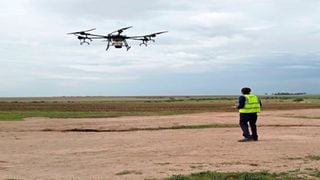
A technician uses a drone to spray a farm in Narok County in February last year.
| PoolNews
Premium
Robots and drones: How the fourth industrial revolution is changing the world
Riyadh, Saudi Arabia
Soothing music from a robot welcomes you to the main hall. The beat transposes from steady to pitter-patter, before it thrums as hued lights flash in tandem on a large screen.
“Welcome to Leap 2022,” the robot announces amid applause from about 1,500 tech experts. In the next hall, another robot is moving around distributing chocolate bars and bottles of water to participants. Ever heard of the Fourth Industrial Revolution? This is it.
The fourth industrial revolution conceptualises rapid change to technology, industries, and societal patterns and processes in the 21st Century due to increasing interconnectivity and smart automation.
Around the 50,000 square-meter exhibition area of the Leap 2022 tech conference, start-ups and big tech corporates are competing to wow delegates with their latest innovations.
About 15 metres from the expo, software company SAP Systems is floating holographic simulations in the air to shout out its slogan, “the best run”.
In yet another exhibition zone, a smart ambulance with drones connected to it is demonstrating how 5G technology is changing emergency healthcare.
“Doctors can video call the ambulance and start treatments before the vehicle reaches the hospital,” says Mr Valdas Bockus, director of engineering at Ace Tech. It is enthralling.
Medics can make decisions faster after viewing the degree of emergency care needed, allowing them to send drones to pick and deliver the right medicines before the ambulance ferrying the patient arrives.
Elsewhere, an expert explains how drones, loaded with 2,000 litres of pesticide or water, can be scheduled to spray or irrigate plantations.
Farmers can choose the frequency of spray and also send them to specific areas of the farm. The farmer also gets immediate notification about any intruder on the farm on his phone, wherever he or she is in the world.
The alluring power of kaleidoscope technology is also creating a buzz. A kaleidoscope is an optical instrument with two or more reflecting surfaces (or mirrors) tilted to each other at an angle, so that one or more (parts of) objects on one end of the mirrors are seen as a regular pattern when viewed from the other end, due to repeated reflection.
You walk, for instance, into a room where reflected light is used to create beautiful, fascinating patterns that interchange smoothly. A humming, jazz beat makes it ensnaring.
Tech experts are explaining some of the world’s most complex technologies, such as blockchain, intravenous cannulation, quantum computing and even the metaverse in a fathomable and lucid manner, so all 100,000 registered attendees can understand.
“The future will be defined by cognitive meta cities. It is a vision focused on experiences rather than scale,” says Mr Joseph Bradley, chief executive of NEOM Tech and Digital Company.
His metaverse product, XVRS, aims to put human needs at its core by giving them more time and space to maximise their daily potential.
His other product, M3LD, focuses on placing data ownership back in the hands of users and restoring trust in the data economy.
“It is time to believe. Time to dream. Let’s leap forward,” he remarks as he exits the main hall presentation stage amid applause.
Pasqal, a start-up founded in 2019, aims to unleash the power of quantum computing to solve the world’s biggest challenges, including climate change. It enthralled the audience at how it creates processors that can tackle computational problems, rendering classical computers inefficient.
One hall is constantly focused on future energy, with discussions on intelligent solutions for e-mobility and hydrogen energy. A rocket fuel start-up competition is ongoing, all targeting to win Sh113 million.
Saudia Arabia, a country that has for long depended on petroleum to power its economy in a period of rapid technological revolution, seems to be gradually learning the ways of the economy of the future, where even 5G internet speeds will be obsolete.
Though the country’s tourism experience is magical, 95 per cent of the nation is a desert. Its sand hills and sand dunes and the only escape route to trudge forward confidently is technology.
In 2016, the government launched the Saudi Vision 2030 to reduce the country's overdependence on oil and diversify its economic resources through innovation.
In its first ever global tech event, the government is banking on technology diplomacy to entrench its innovations across gulf countries while also setting a keen eye on Africa.
It is a founding member of the Digital Cooperation Organisation (DCO), which launched a startup passport programme during the event to allow startup founders to exchange knowledge, with Nigeria being the latest member.
“This passport reduces administrative and financial burdens,” says Ms Deema Al-Yahya, Secretary-General of the DCO. It provides free entry into the eight DCO countries while endorsing the Elevate50 Initiative which aims to support 50,000 small and medium sized enterprises to sell their products online, creating 5,000 jobs in the process.
Saudi business leaders are also warming up to the rest of the world, with priority of start-up financing now going to women in a country where ladies were not allowed to drive four years ago.
Also launched during the event is the Start-up District dubbed the Garage, which will support tech talent with training, research, grants and workspaces, both local and foreign.
The Saudi government has announced a Sh700 billion investment in tech-based solutions.
“These initiatives aim to grow our digital economy,” says Mr Abdullah Alswaha, Saudi Minister of Communications and Information Technology.
It’s such efforts that made Apple select Riyadh as its first Apple Developer Academy headquarters in the Middle East to cater for female programmers at the Princess Nourah Abdulrahman University.





